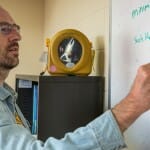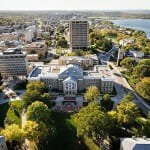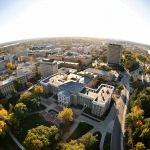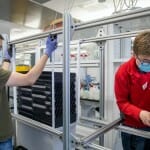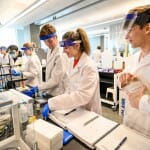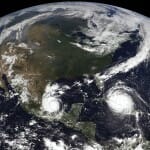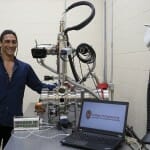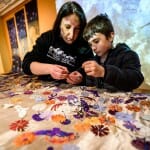Category Science & Technology
Detailed analysis of old star provides template for heavy element formation
In a new study, astronomers identified the elemental composition of HD 222925, a Milky Way star located over 1400 lightyears from earth.
UW mourns an important mathematician and beloved mentor
Georgia Benkart, emeritus professor of mathematics, died unexpectedly on April 29. “Each of her papers was a polished gem,” a colleague says of Benkart. Among many professional distinctions, she served as president of the Association for Women in Mathematics in 2009–11.
Drone-delivered defibrillators could save lives
The new research details the framework for designing a network of AED-outfitted, autonomous flying drones, which could allow the life-saving devices to more quickly reach people experiencing cardiac arrest.
UW School of Computer, Data & Information Sciences adds three degree programs
The new degree programs, which will launch in the fall, are designed to increase skills that are in high demand, preparing a talent pipeline that will drive economic growth in the region and beyond.
Study finds 63% of teens have healthy relationship with digital technology
Researchers in the UW School of Medicine and Public Health say family rules on the amount of screen time teens are allowed are less effective in fostering good digital practices than focusing on the content of what they are viewing.
Shifting food choices reducing climate impact of American diet
Lower consumption of beef, dairy, chicken, pork, and eggs accounted for more than 75% of the observed diet-related carbon dioxide savings during the study period.
UW–Madison’s ultra-efficient carbon capture tech earns top 60 spot in global XPRIZE challenge
Team members are forming a company and actively seeking additional funding from venture capitalists and other sources.
UW–Madison, industry partners run quantum algorithm on neutral atom quantum computer for the first time
The achievement suggests quantum computers that outcompete traditional ones are on the horizon, with potential uses in logistics, drug discovery and computational modeling.
Chemical reaction: ‘a huge upgrade’
The recently opened addition to the Chemistry Building on University Avenue is a nine-story tower housing lecture halls, an information commons, offices, teaching laboratories, and group write-up spaces for undergraduate teaching labs.
UW hurricane application gets upgrade in time for 2022 hurricane season
Forecasters at the National Oceanic and Atmospheric Administration’s National Hurricane Center will have access to the most advanced storm measurement software yet to help them save lives and property with timely warnings.
A penetrating gaze: System allows world’s first X-ray look at electron-beam 3D-printing process
A team of UW–Madison mechanical engineers have pioneered the integration of several imaging technologies into a system that can study the fundamental mechanics of electron beam powder bed fusion in real time.
Federal lawmakers visit UW–Madison units in south, west Madison
Sen. Tammy Baldwin and Rep. Mark Pocan showed their support of UW–Madison on April 15 during stops at the West Madison Agricultural Research Station and the UW Odyssey Project in the UW South Madison Partnership office.
Space telescope ‘a little like a time machine’
Assistant professor Michael Maseda was one of many who contributed to development of the James Webb Space Telescope. He looks forward to using the instrument to take “baby pictures of galaxies” — potentially looking as far back into the history of the universe as the Big Bang itself.
You’re muted — or are you? Videoconferencing apps may listen even when mic is off
Not only did researchers find that the apps gather audio data while "mute" is activated; they could identify activities picked up when microphones weren't believed to be on, such as eating, playing music, typing and cleaning.
Four UW–Madison students awarded prestigious 2022 Goldwater Scholarships
Each university in the country may nominate up to four undergraduates for the annual award. To have all four candidates win is remarkable.
Diving into science with eager hands and brains
People of all ages got their hands dirty and their brains revved up as part of Science Expeditions, an annual open house to illustrate the value — and fun — of scientific research on campus.
Melting ice caps may not shut down ocean current
Building upon previous work, researchers are revising their understanding of the relationship between Atlantic Meridional Overturning Circulation and freshwater from melting polar ice.



